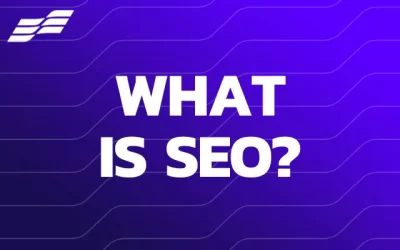Artificial intelligence, or AI, tools for marketing and search engine optimisation (SEO) sound great. A tool that can write content, create images and automate a bunch of your processes? Amazing! Or is it…
While AI marketing tools can certainly speed up some of your processes, if you’re not already experienced in what you’re having AI do for you, you could be at risk. Even seasoned industry professionals have fallen victim to using incorrect data or unoriginal content.
The reality is, Google and other search engines are cracking down on quantity-driven content that lacks originality and authority. This means the days of using AI to knock up a web design or content may already be nearing its end — unless you know what you’re doing.
What is AI in marketing?
AI marketing is the use of artificial intelligence tools, software and technologies to perform marketing tasks. There are many different ways AI can be used in marketing, including to analyse data, help with planning, make content and more. Many platforms are creating and releasing their own AI software to help keep on their platforms, such as Meta AI, LinkedIn’s AI features and more.
How is AI used in SEO?
There are many ways people, including search engine optimisation specialists, are using AI to help optimise websites. AI is very popular to help in keyword research, increasing the quantity of content and even analysing data.
However, to be done successfully and ethically, there still needs to be a human level of fact checking, content optimisation and quality assurance. If you already have SEO skills, it can help you speed up your processes, but it is far from a replacement for human expertise. For an untrained person using tools for SEO, you may find you do more harm than good.
Top 5 Risks AI Tools May Have on Your Search Engine Optimisation
Before we dive into the potential risks AI tools may have on your SEO, it’s important to remember what Google and other search engines are looking for before deciding who to place where in search results. And that’s E-E-A-T (Experience, Expertise, Authority, and Trust). These are the primary elements Google measures your website against, which are put at risk when you use AI tools. This is how.
1. AI cannot generate original concepts.
AI tools utilise information that is already available online to generate content. This means what these tools produce for you is regurgitated information/content, even if it’s not duplicated. While it’s good for creating large quantities of content, that content won’t be original with the best value to the user. Google doesn’t want to see it.
In Google’s own words about their crackdown on quantity-driven content:
“Scaled content abuse is when many pages are generated for the primary purpose of manipulating Search rankings and not helping users. This abusive practice is typically focused on creating large amounts of unoriginal content that provides little to no value to users, no matter how it’s created.
.
This new policy builds on our previous spam policy about automatically-generated content, ensuring that we can take action on scaled content abuse as needed, no matter whether content is produced through automation, human efforts, or some combination of human and automated processes.”
In fact, AI-generated content is so unoriginal, it’s not protected under Copyright Law. The only exception is if a human can prove they have ‘contributed enough independent intellectual effort’. So, if someone repurposes your content you’ve used AI to generate, you may have no leg to stand on in getting them to stop.
2. There is a risk of republishing false information.
There can be more repercussions than losing some rankings if you use AI-generated content that hasn’t been fact checked. ChatGPT has been known to have what are called ‘hallucinations’, where it generates fabricated information. This can put you, your business and anyone who potentially uses that information at risk. If Google detects false information, it may also deindex (not show) your content at all.
Just take a look at the 2023 Mata v Avianca case in the United States where a lawyer submitted briefs and case citations he found via ChatGPT that were found to be ‘hallucinations’. Once found, the court dismissed the client’s case, sanctioned the lawyer, fined the lawyer and their firm and the law firm’s reputation went down the drain. There have been many other cases of this around the world and across many industries. So, check your content and check the sources. Better and potentially quicker still, do the research yourself.
3. AI-generated content lacks your expertise and personality.
Your experience and knowledge is why people choose you. This same experience and knowledge should be front of and centre on your website. If you are simply copying and pasting content from ChatGPT, then it already lacks this personalisation, authenticity, expertise, authority, and trust.
4. You may over-optimise your website.
When it comes to your website, you can have too much of a good thing. If you’re not experienced with organic search marketing best practices, you may end up over optimising your website. This may include keyword stuffing (using too many keywords), too many internal links, ranking for irrelevant keywords that do nothing for your business (or even hurt your business), and more.
If you’re new to the world of SEO, it may surprise you that the goal isn’t to please search engines, but to appeal to humans. Google ranks pages highly when they are helpful and trustworthy to their users, so this is and should be your goal. And while you can certainly teach AI to do what you need it to, it’s not perfect and you still need to be putting in the time and effort to get it right. Which leads us to our next point.
5. SEO and AI tools are still complex.
There are hundreds of factors that can influence where you’re ranked in search engine results, if at all. AI isn’t going to magically mean you don’t have to spend time first learning the core best practices, and then the time to keep up with news and changes in the SEO industry. And if you don’t know that information, it’s going to be incredibly difficult for you to be able to direct AI tools to give you the content and support you need that will actually help your business.
AI tools themselves are a learning process. They don’t always give the responses you want, and you need to have the time, patience and know-how to train them to be delivering the information you want. This is a skill you can learn, as is SEO, but again, it takes time. That is time you could be spending on other areas of your business, or with your friends, family or doing what you love. So, this is why we say leave SEO up to the experts if you want results.
The Future of AI in SEO & Marketing
AI is here to stay. It’s useful when used correctly and can definitely help you with your SEO efforts. But it shouldn’t be abused or misused.
For SEO experts, AI will become a useful way to provide more support to more people. As for business owners, it’s wise to question your agencies or SEO people about how they use or plan to use AI in your optimisation. If you feel like AI has impacted your search engine results, then our team at Digital Surfer are more than happy to help. Get in touch today to see how we can help you level up with organic search marketing.





